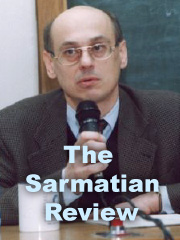| This Issue | Back Issues | Editorial Board | Contact Information |

Poland's Transformation:
A Work in Progress
Reviewer: Beata Plonka
Poland's Transformation: A Work In Progress
Edited by Marek Jan Chodakiewicz, John Radzilowski, and Dariusz Tolczyk. Studies in Honor of Kenneth W. Thompson. Charlottesville, VA: Leopolis Press, 2003. 295 pages. Paper. $29.95.
Beata Plonka
As one of the authors of the book notes,"even during the decades of Communist rule, Poland was never quite like the other countries within the Soviet orb" (A. E. Dick Howard), and in many respects it still remains a peculiar case. What made Poland special in the post-World War II period was its firm resistance to the rudiments of Communist ideology, such as forced atheization of the society and collectivization of land--ideas that made their way into all other countries of the Soviet bloc. Poland was the sole exception. Perhaps because of these peculiarities, in the 1980s the impetus for political change took many by surprise: the strongest anticommunist movement of 10 million Solidarity members and the negotiated end of Communism set up an example for other countries of the region.
For those who seek to understand Poland in its prolonged transition period, this compilation of articles by Polish and American experts provides an exhaustive overview of the country's politics, law, economy and culture. It is indeed an exemplary collection among books recently published in English. The volume covers crucial points of the Polish Revolution and the meanders of modern Polish politics after consolidation and legitimization of power assumed by anticommunist opposition.
A comprehensive introduction to the roots of the Polish anti-Communist uprising in the 1980s is provided by a respected historian, Wojciech Roszkowski. A thorough study of the new Polish constitution and legislation system is provided by both Polish and American specialists. While Zbigniew Stawrowski and Krzysztof Jasiewicz view both critically, the system is applauded by American law expert A. E. Dick Howard. Other important elements of the postcommunist world, such as corruption, civil society building, the role of the Catholic Church, as well as the still-troublesome question of property restitution, are likewise considered. The country's geopolitical position and its relations with Russia and the European Union occupy much space, and references to the United States' history in the writers' essays make Polish situations more comprehensible to American readers. Two complementary overviews of Poland's international policies are provided by a Polish historian, Jerzy Holzer, and a Polish-American historian, John Radzilowski. Readers who have been exposed to debates over the country's modern history will find familiar concerns analyzed here: Poland's peripheral position in Europe, the extremist views of certain social groups, and their theories of modern European history. Marek Jan Chodakiewicz's colorful description of shades and fractions in Polish postwar politics and of the national perception of history makes for particularly good reading. Polish literature in the new market-driven world is described by Dariusz Tolczyk.
After fourteen years, one would expect the transition period to be over, especially after the introduction of the radical "big bang" reforms and the outburst of popular enthusiasm for a new political and economic course at the beginning of the 1990s. While most systemic changes have already been introduced, the hardship imposed on the society created a heavy burden that slows down the transformation. Societies that adapt to new systems more slowly than their political and economic institutions find themselves at a disadvantage at the time of change. Despite the general belief that there will be no return to the old system, the Poles often feel lost in the new reality, and as sociologist Edmund Wnuk-Lipinski points out, "a sense of relative deprivation appears to prevail among the masses which leads to popular pessimistic assessments, both in regard to the country's future and concerning the individual's place in the society." Thus we find that overall Polish self-criticism and low self-esteem manifest themselves in surveys and publications in the postcommunist period.
Many of Poland's problems in the area of economy, culture, and politics are shared by the country's neighbors, of course. Yet Polish collective memory expects beautiful results instantaneously. With just a few prominent exceptions, Polish post-1989 culture seems to confirm the thesis that more beautiful songs are likely to be composed in prison.
Back to the April 2004 Issue
The Sarmatian Review
sarmatia@rice.edu
Last updated 4/23/04